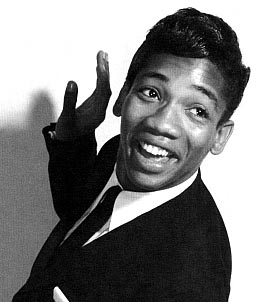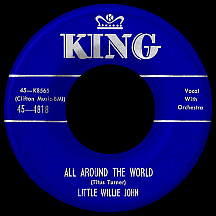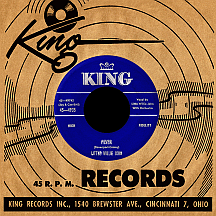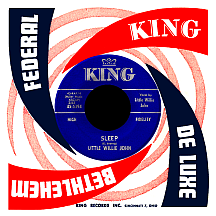LITTLE WILLIE JOHN
In preparing to write about one of my favorite singers, Little Willie John, I got out my collection of his King 45s (17 of them) and listened to both sides of each in one sitting. I normally hear an artist's music one or two songs at a time while listening to a variety of artists and genres (after all, variety is the cornerstone of a healthy musical diet). But revisiting Little Willie's hits and misses nonstop, more or less chronologically over about an hour and a half, made the brilliance of his vocal talent all the more pointed...and thrilling. Still, the devastation of his short but eventful life and its tragic end seems to hang over every song and, strangely, makes it all a bit elusive. But the best artists are never one hundred percent accessible; that's one reason we keep coming back to them.
Willie was born in Cullendale, an easy-to-overlook spot in the road near Camden, Arkansas. In 1941, at the age of four, his family moved to Detroit for a jolting big city change of pace. His father, Mertis John, worked at the Dodge automobile assembly plant in Hamtramck near the North Detroit projects where the family resided. His mother was a singer; Lillie Robinson had once performed in nightclubs in New Orleans' French Quarter, but those days were long gone, her ten children being the all-consuming priority of the still relatively young woman. Willie constantly sang around the house as a child and his mother and siblings didn't mind. In fact, they were a bit in awe of what seemed a natural passion easily transferred to song. He sang gospel with some of his older brothers and sisters, who called themselves The Gospel Four. Willie had energy to spare; he was a bundle of nerves, or so it seemed. He sometimes had seizures, which became an increasing problem as he grew older.
While attending Cleveland Junior High School around 1950, Willie got into some minor trouble; he and his friends had been swearing a lot and being a bit too forward with female schoolmates. They were sent to the Moore School For Boys, where discipline was handed down without hesitation. After a year there, he enrolled at Pershing High, later taking singing lessons at the Wayne University campus, though he wasn't technically a student there. Johnny Otis held a talent competition in Detroit and was duly impressed by the young singers who showed up, including Jackie Wilson, The Royals (who later wowed crowds as Hank Ballard and the Midnighters) and 14-year-old Willie John.
Otis recommended him to Syd Nathan of Cincinnati's King Records, but Nathan wasn't interested, perhaps because of the singer's age. His first recording turned out to be a seasonal outing for a small label, Prize, in 1953. "Jingle Bells" was a more or less straight version backed with the overly sentimental "Mommy What Happened to Our Christmas Tree," credited to Willie John and the Three Lads and a Lass. Several months later, still in high school, he auditioned for saxophonist Paul Williams (of late '40s "Hucklebuck" fame) and was hired to tour with his band. One single by Williams on Rama, "Ring A Ling," came in '55 with a rousing vocal performance by Willie that hinted at what was to come.
Singing with such a well-established band was a big break for Willie, but what Paul saw was an unruly youngster (albeit a talented one); the time spent at the Moore School apparently hadn't been enough. Williams fired him. John auditioned for King Records again, this time with Henry Glover at the label's New York office. Glover was impressed and wasted no time getting him into the studio. "All Around the World," a hot rhythm rocker written and recorded by Titus Turner for Mercury's newly-formed Wing subsidiary, was covered by John (called "Little" Willie after his height, or lack thereof) for his King debut. Glover gave it a bluesy treatment; as if by design, Willie's a cappella opening introduced his high tenor to an unsuspecting audience: 'Well, if I don't love you baby...grits ain't groceries, eggs ain't poultry...and Mona Lisa was a man!' An immediate hit, the single rode the rhythm and blues charts from mid-September '55 through the end of the year, spending most of its run in the top ten.
Glover became obsessed with making a major star of Little Willie John and had few, if any, concerns about the singer's volatile personality, for a time at least. Recording dates took place in New York and at King's Cincinnati headquarters. "Need Your Love So Bad" was composed by Willie's older brother Mertis John, Jr.; an emotional love song, it was a top ten R&B hit in early 1956. The industry was abuzz over this dynamic new singer, two-for-two in the hit department. John began playing to larger, standing-room-only audiences; King/Federal newcomer James Brown opened for him on many of these shows, developing his sensational "Please, Please, Please" routine. Before long James and his Famous Flames were upstaging the younger Little Willie, who failed to hit with his next, self-penned release, "Are You Ever Coming Back."
The fourth single, on the other hand, is the song Willie will always be remembered for, with an impact so strong that it's still widely known some six decades later. Otis Blackwell (writing under the alias Joe Davenport) and Eddie Cooley (a songwriter who scored his own hit as a singer, "Priscilla," later in the year) came up with "Fever," capturing the singer's sexual energy and nervous demeanor ('Sun lights up the daytime, moon lights up the night...my eyes light up when you call my name 'cause I know you're gonna treat me right...') in an epically ominous arrangement. Legend recounts a grueling six-hour session on the one track, trying to get it just right. It was worth the effort. A number one R&B hit in July 1956, it also crossed over to the top 30 of the pop charts, introducing the singer to a much larger audience. Other artists followed suit with their own cover versions; Ray Peterson chose it for his debut RCA Victor single in 1957, though it wasn't successful...but there would be other versions throughout the years that would help ensure the song's place in pop culture.

"Do Something For Me" wasn't much more than a routine ballad in comparison to its predecessor, yet it was a minor hit at the end of '56 (its flip, "My Nerves," had energy, though it was an obvious sequel to "Fever"). Then came the unexpected: no hits. Seven releases in a row failed to catch on in 1957, a losing streak finally broken in early 1958 with Joe Seneca's "Talk to Me, Talk to Me," an atmospheric ballad that returned John to the R&B top ten and landed him in the pop top 20. The success of this romantic song prompted more of the same; vintage tunes were often adjusted to Willie's technique. "You're a Sweetheart," a Jimmy McHugh-Harold Adamson song used as the title of a musical released by Universal Pictures in 1937, was performed in the film by its stars, Alice Faye and George Murphy; John's heartfelt remake hit the charts in the summer of '58.
Pop singer and Academy Award-nominated actress Peggy Lee did her part to keep Willie's signature song alive that year, inadvertently making it more closely associated with her, perhaps, than its original artist. Peggy's take on "Fever" contained a whole batch of new lyrics that she purportedly ad-libbed, referencing literature ('Romeo loved Juliet, Juliet she felt the same...when he put his arms around her, he said Julie, baby, you're my flame') and history ('Cap'n Smith and Pocahontas had a very mad affair...when her daddy tried to kill him, she said daddy oh don't you dare...he give me fever!'), sparking the imagination of music fans. It was a top ten hit in August '58. Lee wasn't the only artist to keep interest in the song above 100 degrees on the thermometer; Elvis Presley's version appeared on his smash post-Army album Elvis Back! in 1960 and The McCoys had a top ten hit with the song in '65. 'Fever, yea, I burn, forsooth!'
His wild oats supposedly sown, Willie got married and had a son in 1958, followed by another in 1960. "Leave My Kitten Alone," a strong uptempo track written by Willie with James McDougal and Titus Turner, was a fair-sized hit in '59. Ballads "Let Them Talk" (written by pianist and former King Records artist Sonny Thompson) and "A Cottage For Sale" (a standard composed by Willard Robison and Larry Conley in the late '20s) followed in early 1960. Next came a hot cover of "Heartbreak (It's Hurtin' Me)," written and recorded by Jon Thomas, who had played piano on some of Willie's early efforts. A gut-wrenching screamer by Willie contrasted Thomas's laid-back vocal on the original, though the two versions had near-identical sax-and-organ backing tracks; both were top 50 hits that summer with John's version reaching the top 40, though on the R&B charts Thomas had the bigger hit.
Back in Detroit, older sister Mable John was signed by Berry Gordy as one of Motown's early artists. A fine singer in her own right, she had four singles on Tamla between 1960 and '63, but it wasn't until 1966, after working for a time as one of Ray Charles' backing group The Raelets, that she finally scored a solo hit with "Your Good Thing (Is About to End)" on Stax. Willie's hits kept coming: "Sleep" relied on strings and a prominent organ break to make it stand out. Written by Earl Lebieg, it was a number one hit for Fred Waring's Pennsylvanians in 1924 and was also popular by Ben Selvin that same year; more recently it had been successfully revived as an instrumental by super saxophonist Earl Bostic (in '51) and grandiose guitarist Les Paul (in '53). Little Willie's ethereal sleepytime sonata became the biggest pop chart hit of his career, just missing the top ten in the fall of '60.
John and his family moved to Miami, Florida around this time, where longer hiatuses were spent between recording dates and tours. His next hit, "Walk Slow," was written by Willie in collaboration with his wife, Darlynn John, who often gave him ideas for songs. "Leave My Kitten Alone" had a second run in early '61, competing with a version by Johnny Preston. Love ballads (Ray Noble's 1934 standard "The Very Thought of You") alternated with rockin' uptempo songs (Paul Tannen and Shorty Long's "(I've Got) Spring Fever" and Mertis John's "Take My Love (I Want to Give it All to You)") that featured backing vocals by The Midnighters (without leader Hank Ballard). Artists in many genres were inspired by John's music; "Talk to Me, Talk to Me" was successfully reworked in 1963 (its title shortened to just one "Talk To Me") by San Antonio-based Tejano band Sunny and the Sunglows. In '64, The Beatles did a version of "Leave My Kitten Alone" that sat on the shelf for many years before finally being released in the 1990s.
Ultimately, a combination of several things led to Willie's downfall. A drinker since his teens, he later took to doing harder drugs (one excuse was that it helped him keep potential seizures under control during grueling tour schedules) and by the early '60s he'd become quite unreliable, often missing recording sessions, causing unnecessary expense for the label. King Records terminated his contract in 1963 but continued putting out leftover material for some time, in addition to singles and albums containing his hits. Sensitive about people referring to his five-foot-four height, he took to carrying a knife and, at times, a gun; in 1964, during an argument with a man at a Seattle nightclub, his uncontrollable temper resulted in that man's death from a knife wound. John was convicted of manslaughter and, after lengthy legal proceedings and court delays, he was sentenced to a minimum of eight years in the Washington State Penitentiary in Walla Walla beginning in the summer of 1966, shortly after some final recordings were made for Capitol Records that went unreleased for decades. His wife Darlynn and young sons Kevin and Keith left Florida at that time and returned to Detroit. The cause of his death in prison at age 30, on May 28, 1968, is uncertain, though documents listed it as a heart attack.
When listening to his music, it's hard not to feel a disquietude brought on by these later developments, but I've found the severe consequences of his actions give his music an added dimension beyond the romantic themes. Certain lines stand out - for example, 'Feel like I been run through the mill...I can't move around and I can't stand still...I'm so jittery' (from "I'm Shakin'") could represent that uneasiness he always seemed to have. 'I need someone to stand up'n tell me when I'm lyin'' (from "Need Your Love So Bad") suggests possible remorse for irresponsible behavior. 'My search was such a blind one...and I was all at sea...' (from "You're a Sweetheart") was, simply, hauntingly delivered. The isolation of his later years seems to have been heartbreakingly predicted in one of his last hits, "Now You Know": 'You never knew...how it would feel...to be left all alone...now you know, now you know, now you know...' The depth of his passion can be interpreted as the listener chooses, enhanced by just how deeply one cares to immerse himself, or herself, in the truly amazing, ever-so-slightly intangible appeal of Little Willie John's many recordings.
NOTABLE SINGLES:
- Jingle Bells /
Mommy What Happened to Our Christmas Tree - 1953
by Willie John and the Three Lads and a Lass - Ring A Ling - 1955
by Paul Williams and his Orchestra - All Around the World - 1955
- Need Your Love So Bad /
Home at Last - 1956 - Fever /
Letter From My Darling - 1956 - Do Something For Me /
My Nerves - 1956 - Talk to Me, Talk to Me /
Spasms - 1958 - You're a Sweetheart /
Let's Rock While the Rockin's Good - 1958 - Tell it Like it Is - 1958
- Leave My Kitten Alone /
Let Nobody Love You - 1959 - Let Them Talk - 1959
- A Cottage For Sale /
I'm Shakin' - 1960 - Heartbreak (It's Hurtin' Me) - 1960
- Sleep - 1960
- Walk Slow - 1961
- The Very Thought of You - 1961
- (I've Got) Spring Fever /
Flamingo - 1961 - Now You Know /
Take My Love (I Want to Give it All to You) - 1961 - I Wish I Could Cry - 1962




